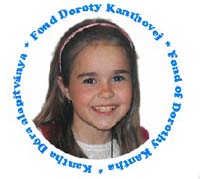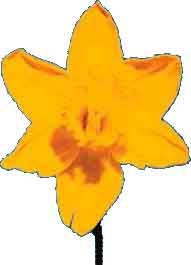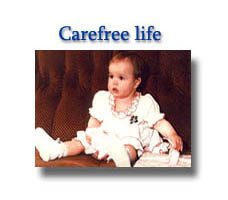







|

|
The Story of Dórika
-
Dorothy Kantha, often addressed by us as Dórika, was the most enduring among the four grandchildren. She was born on 16. 04. 1989 and two years later her brother was born. She was not sickly; she got over only the common childhood complaints. In April 2000 both our children had angina, they got antibiotics and went on a control all at once. It was stated that Dórika was healthy. She went back to school and her brother David stayed at home for 10 days more and used antibiotics henceforth.
 A whole month passed. Dórika was making complaints on lethargy, fatigue, she was pale and suffered with dyspepsia. We, as her parents put these symptoms down to the oncoming end of school year and the usual tiredness in springtime. We asked her pediatrician and she let make out a blood-letting. This happened on 2 June at 8 o’clock in the morning; in the noon we were given the results:
A whole month passed. Dórika was making complaints on lethargy, fatigue, she was pale and suffered with dyspepsia. We, as her parents put these symptoms down to the oncoming end of school year and the usual tiredness in springtime. We asked her pediatrician and she let make out a blood-letting. This happened on 2 June at 8 o’clock in the morning; in the noon we were given the results:
She had an acute lymphoblastic leukemia.
At 5 o’clock in the afternoon she was lying in Bratislava at the Department of Oncological Diseases. She started her tough fight. We tried to calm her down; we tried to explain her that the other children at the department without hair were suffering from other diseases. Later on we had to tell her the truth and she became willful at once that she was suffering from a deadly illness. We tried to soothe her by telling her that the doctors were able to cure this illness.
At of this kind of leukemia the optimal chance of success of the therapy is about 70-75% and our prognosis was promising. It was so because her illness was diagnosed at an early state. We were also filled with hope because her organism reacted to the chemotherapy really well. Her doctors were not even contemplating about marrow transplantation because it was not necessary.
I, Dórika’s mother, was by her side during the whole therapy; I requested for copies of her results, too. I was not concealing that we wanted to consult her results and therapeutic treatments with other specialists as well.
We were looking for help in Budapest, Prague and in Switzerland, too. We received the same answers from elsewhere: the methods used before in her therapy were right; it was unnecessary to take her elsewhere.
Everybody wanted to help us – unknown and intimate people as well. We were recommended to use different preparatories to strengthen her immunity, to supply her nourishment and to eliminate the undesirable sequels of chemotherapy. We imported all these supplementary preparatories. We could not give these to Dórika because doctors objected that the patient was getting everything she needed. They did not know these medicines, there were not registered at the pharmacopoeia used in Slovakia.
At the request of the doctors we were looking for blood donors. Our intimate friends arrived in Bratislava and they gave their blood directly at the hospital. Unknown people helped us too. Amongst the blood donors there were also 13 soldiers of the honorable guard of the president of Slovakia.
The first stage of the therapy was the worst. After the defending of chemotherapy not only the diseased cells were broken down, but also the utility of almost all her other organs.
 Every day we were longingly anxious about the betterment of her test results, the disappearing of the thrushes and vesicles, the detensioning of her pain and throes, and the good results of marrow-taking. Infusions, vomits, hardened veins on her hands continued to remain. In July that year I requested for applying the port-a-cath methode so that she could get the infusions through this device placed under her clavicle. We were happy that her remission persisted. At the end of August she was leukopenic again, she had high temperatures and she had pneumonia. We thought it was coming closer to the worst. She was fighting pertinaciously and she kept her doctors’ instructions. She succeeded to vanquish prosperously and this is how she was able to overcome this illness. After her hospitalization on 8th of September she was dismissed for the first time for home cure for 5 days.
Every day we were longingly anxious about the betterment of her test results, the disappearing of the thrushes and vesicles, the detensioning of her pain and throes, and the good results of marrow-taking. Infusions, vomits, hardened veins on her hands continued to remain. In July that year I requested for applying the port-a-cath methode so that she could get the infusions through this device placed under her clavicle. We were happy that her remission persisted. At the end of August she was leukopenic again, she had high temperatures and she had pneumonia. We thought it was coming closer to the worst. She was fighting pertinaciously and she kept her doctors’ instructions. She succeeded to vanquish prosperously and this is how she was able to overcome this illness. After her hospitalization on 8th of September she was dismissed for the first time for home cure for 5 days.
The second stage of her therapy was more tolerable. Her stays at the hospital were shorter and the residence at home was drawn out (from 17.09. for 12 days, from 03.10. for 9 days, from 20.10 for 6 days, from 30.10. for 28 days, from 02.12. for 3 days and from 08.12. for 5 days). We were excited about the results of the control of her marrow taken on 20th of November. The results were good again: her remission persisted. On 13.12.2000 we traveled to Bratislava to have Dórika given an infusion then to get home. She was not given the infusion because the level of trace elements did not reach a measurable standard. The doctors could not make out the causes for this state and they stopped the chemotherapy. Dórika started to become paralyzed. She was sent to a neurologist and they started to do exercises with her. The hospital was getting ready for Christmas. On 23 December Dórika was sent home. This was the first time she needed a wheelchair. We were encouraged that this was only a temporary situation and only because she reacted in a different way as other children. On 27th of December we were required to report for blood-letting in Komárno and in case of good results we would have continued the chemotherapy. According to the Protocol II. ALL-BFM 95 two cytostatics were waiting for Dórika, followed by the same cytostatics after a week and a final control of her marrow. This would have meant another one month at the hospital. After all this it would have continued with a retention phase of the therapy.
On 24. December we decorated our Christmas tree. Dórika was most captivated by a small white plush dog, she pressed it to herself and she did not even look at the other presents. The other day around one o’clock she was feeling ill. The doctor on duty advised us to take her to the hospital. She refused to go. We packed her things and set out. We arrived at the parking place; there the nurses were already waiting for us. She greeted the nurses, as we seated her in the wheelchair. When we entered the building she noticed the door-keeper and said: “I cannot breath”. These were her last words. We were rushing to the lift. The oncological department is on the minus second floor. The lift headed down and Dórika’s soul up. In the afternoon at four o’clock, on the day of Christ’s birth. The doctors tried to resuscitate her but they were helpless.
We agreed to the dissection. In the protocol of the autopsy it is quoted that the immediate cause of her death was an ulcer on her colon. She did not die of leukaemia but because of the aftermaths of the chemotherapy. Her brother, cousins and classmates were in contact with her till the last moment – through letters, drawings and telephone. Messages were coming and going till 25. December 2000.
After seven months of superhuman and pertinacious fight for life and hope we were imploded with all the pain in the world. We felt that there was no way out.
No way out? A month after Dórika’s death we decided to establish a foundation. The Regional Authority Office in Nitra registered the Fund of Dorothy Kantha on 12.2.2001 as a non investment foundation. The aim of our foundation is to continue the fight against cancerous diseases, to improve healthcare, conditions and success of therapies and help children who need it the most.
JUDr. Mária Kanthová and Mgr. Gejza Kantha



Webmaster: KWeb